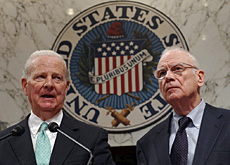
“The Baker report should mark a turning point”

A Swiss expert on Middle East affairs says the Baker report should be a turning point in the war in Iraq but fears it will be largely ignored by the Bush administration.
Victor-Yves Ghebali of the Graduate Institute of International Studies in Geneva also tells swissinfo that President Bush is unlikely to accept a proposal to open talks with Iran and Syria.
The document, named after the co-chairman of the Iraq Study Group and former Secretary of State James Baker, is highly critical of US policy on Iraq. The report lists a series of failures and calls for radical policy change.
It includes 79 recommendations to avoid a slide towards chaos that could trigger the collapse of the Iraqi government and a humanitarian crisis.
The authors urge the White House to begin withdrawing combat troops in early 2008 and advise the government to hold talks with Syria and Iran. The report also calls for greater efforts to settle the conflict between Israel and the Palestinians.
President Bush said he would consider the recommendations of the Baker report, but many experts have expressed doubts.
The Swiss foreign ministry on Thursday welcomed proposals in the report for a diplomatic solution as well as dialogue with all states in the Middle East.
“Switzerland believes that the entire regional context should be taken into consideration when analysing the problem and the solution,” said Lars Knuchel, spokesman for the Swiss foreign ministry.
swissinfo: What’s your take on the Baker report?
Victor-Yves Ghebali: It’s solid and pragmatic work by professionals and could bring a government driven by ideologies down to earth, so to say. It’s a document which takes a good look at the reality and ‘calls a spade a spade’.
By all accounts the report should mark a turning point, if Bush were an ‘ordinary’ president. But considering the psychology of his administration I think it is very unlikely that he will approve the recommendations of the Baker report. Only last week Bush said US troops would stay in Iraq until they have won the war.
The report comes much too late. It’s difficult to understand why Syria and Iran should agree to come to the rescue of Washington unless they can get something in return. But this is not realistic because Bush is not willing to make any concessions.
swissinfo: Could Switzerland play an active role if Washington decided to open discussions with Syria and Iran?
V-Y.G.: Switzerland has indeed represented Washington’s interest in Teheran for many years. But I don’t think the Swiss can do much more than act as go-betweens. They will not be invited to take part in high-level talks over issues such as Iran’s nuclear ambitions.
In a highly unlikely case of national reconciliation in Iraq Switzerland might have a humanitarian role and it could contribute financially and with its economic resources to rebuilding the country.
swissinfo: The Baker report stresses the importance of a solution to the conflict between Israel and the Palestinians. Is this an opportunity to relaunch the Geneva Accord?
V-Y.G.: Absolutely. Everything is possible if the US government decides to put pressure on Israel and to bring both sides to the negotiating table. The Geneva Accord is a very valuable and noble attempt at settling the Middle East conflict.
At the moment not much progress is being made on the road to peace because the moderate elements on both sides are weak. An Israeli pacifist finds it hard to hold on to his convictions in the face of terrorist attacks. The same goes for peace-minded Palestinians who witness disproportionate attacks by the Israeli army in the occupied territories or in Lebanon.
Let’s be clear. The key to resolving the Israeli-Palestinian conflict is Washington, not Tel Aviv. The situation will only get worse as long as the US government refuses to take responsibility. The victims are the civilians in the Palestinian territories and in Israel.
swissinfo-interview: Marc-André Miserez
140,000 US soldiers are currently deployed in Iraq.
Since the invasion of March 2003, more than 2,900 US troops have been killed and about 25,000 seriously injured.
The figures for Iraqi casualties differ widely. Some sources say 120,000 have died over the past three and a half years. Others say up to 650,000 have been killed.
The unofficial peace plan to resolve the Israeli-Palestinian conflict was brokered by two former cabinet ministers, Yossi Beilin of Israel and his Palestinian counterpart, Yasser Abed Rabbo.
The accord was signed in Geneva on December 1, 2003 and has the backing of Switzerland as well as several heads of state and United Nations top representatives.
But it has been on hold after the Israeli government rejected it. The US described it as interesting.
The agreement outlines a plan for the division of Jerusalem and the creation of a Palestinian state, and covers the issues of Palestinian refugees and Jewish settlements.

In compliance with the JTI standards
More: SWI swissinfo.ch certified by the Journalism Trust Initiative





























You can find an overview of ongoing debates with our journalists here . Please join us!
If you want to start a conversation about a topic raised in this article or want to report factual errors, email us at english@swissinfo.ch.